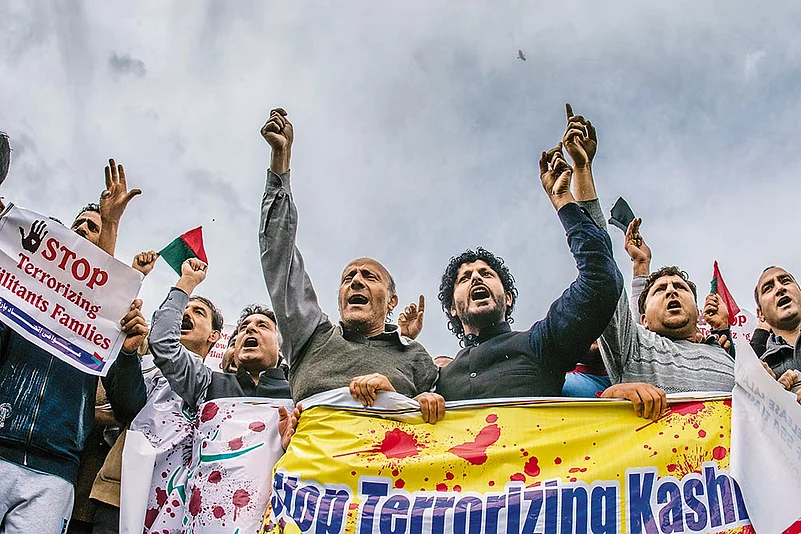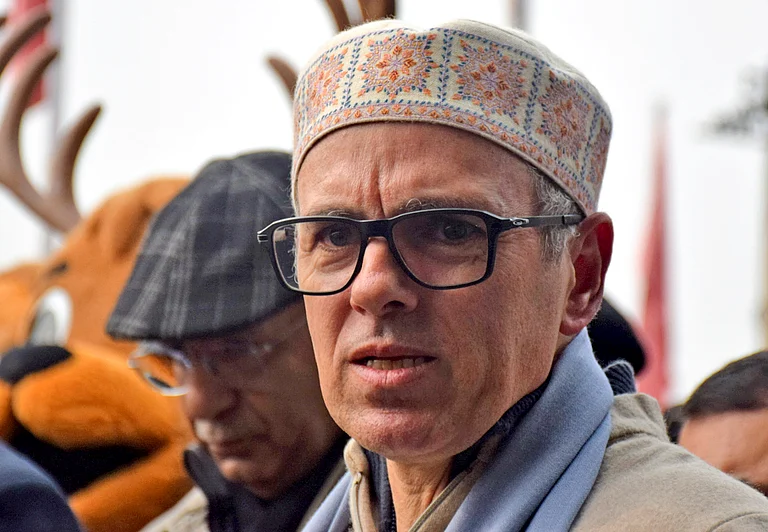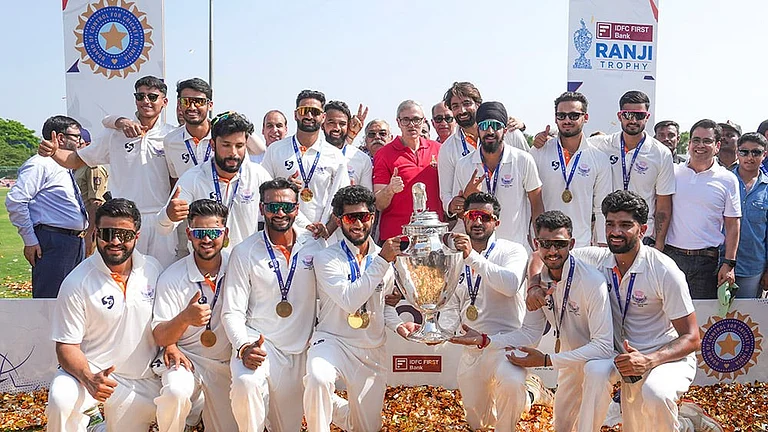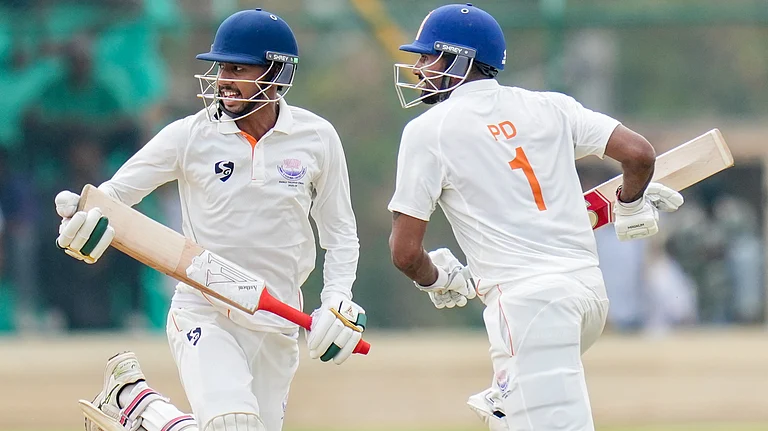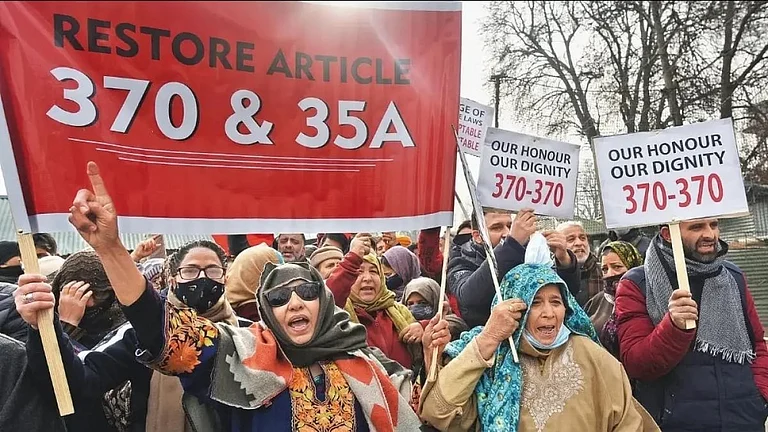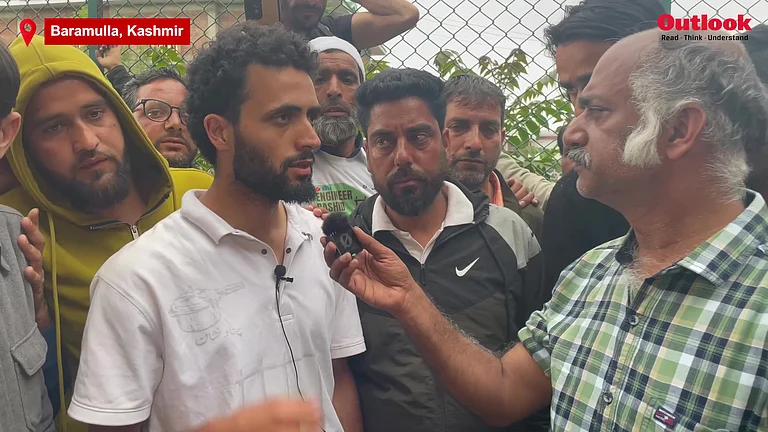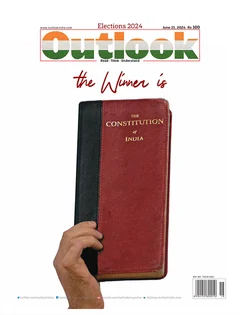
Summary of this article
This story was first published as part of the magazine issue titled 'The Winner Is The Constitution Of India' published in June 2024.
Located amid the idyllic landscape of forest-fringed paddy fields with a clear view of the mountains, the village of Mawar in Kupwara district, is abuzz. Mawar, located in the Langata area, is where Engineer Rashid, Kashmir’s political flavour of the season, hails from. In the recently concluded Lok Sabha elections, Rashid defeated heavyweights like former chief minister and National Conference (NC) leader Omar Abdullah and Jammu and Kashmir People’s Conference candidate Sajjad Lone, in the battle for the prestigious Baramulla constituency. Unlike his defeated opponents, Rashid was—and continues to be— incarcerated in connection with a 2019 Unlawful Activities (Prevention) Act (UAPA) case.
But despite his continued incarceration, even today, after Rashid’s mammoth electoral victory, hundreds of Kashmiri youth trek to Mawar to listen to the jailed politician’s son, 23-year-old Abrar Rashid and Awami Ithad Party (AIP) leaders like Showkat Pandit.
While Rashid founded AIP, he chose to contest as an independent candidate in the general elections because his political party was not a formally registered outfit.
Recently, Pandit was angry over assertions made by some analysts, quoted by NC Vice-President Omar Abdullah on social media, who said, “Rashid’s victory will empower secessionists and give Kashmir’s defeated Islamist movement a renewed sense of hope.”
Pandit tries to correct such political jibes in his engagement with the youth in Mawar. He argues that AIP’s mission is to guide youngsters towards democracy and development, and that Rashid’s massive vote count would encourage more people to embrace democracy and mainstream politics in the region.
Pandit has asked Abdullah to refrain from such tweets, as they undermine the people’s vote. With Abrar Rashid by his side, Pandit reiterates AIP’s commitment to peace, dignity, safety and education.
Rashid’s son Abrar echoed these sentiments, asserting that the victory belonged to the people, not just his father. He says many doubted his father’s decision to file for poll nomination from prison, calling it a miscalculation. However, the massive voter turnout unsettled the opposition, prompting reactions like the one made by Abdullah, Abrar claims.
On Tuesday morning, as counting began for the North Kashmir constituency of Baramulla, Rashid surged ahead, leaving Abdullah trailing. Initially nonchalant, the former chief minister, who at the time was exercising at the Royal Springs Golf Course in Srinagar, downplayed Rashid’s early lead and asked reporters to wait for more rounds of counting to be completed. However, as Rashid’s lead widened, Abdullah conceded defeat.
Many perceive Rashid’s victory, given his prolonged incarceration, as a win for the politics of grievance that is becoming increasingly prominent. Abrar, who extensively campaigned for his father, chanted “Jail ka badla vote se, Tihar ka badla vote se” (Avenge imprisonment with votes, avenge Tihar with votes) and hoped for his father’s release.
Some observers in Kashmir argue that certain sections were deliberately projecting a vote for Rashid as a separatist vote to undercut the huge mandate.
“People came out to vote. Jamaat-e-Islami leaders were in the queue and proudly stating that they had voted. Now you cannot undo this democratic exercise to elect a Parliament member by discrediting it and describing it as a secessionist vote,” says PDP leader Waheed-ur-Rehman Parra, who originally coined the slogan “Jail ka badla vote se” during his campaign in the Srinagar constituency.
While the BJP has been trying to hit at the legacies of the Abdullah and Mufti families, it was the unique dynamics WITHin Kashmir that led to the defeat of two former chief ministers.
He says large-scale voting in Kashmir indicates the trust that Kashmiris have placed in democracy and that the Centre should respect it by initiating reconciliatory measures.
Parra criticised Abdullah for describing Rashid’s victory as one bolstered by the secessionist vote, calling it a “regressive stance that echoes the divisive politics of 1987 and labels a democratic expression as an ‘Islamist wave’”.
Parra argues that such interpretations would perpetuate conflict in Kashmir. Many observers agree, stating that during the campaign, Rashid’s sons’ emotionally charged tenor resonated with the people, contributing to their success.
During the election campaign, all political parties emphasised that the elections were not about development, roads, or electricity, but rather about the release of prisoners, the abrogation of Article 370 and the fight against the Bharatiya Janata Party (BJP).
Abdullah framed his campaign in these terms, describing it as a contest between the NC and BJP proxies. He criticised Rashid’s campaign for focusing on the release of one prisoner: Engineer Rashid. Abdullah claimed that his campaign advocated for the release of all prisoners held in Kashmir and elsewhere.
Political analysts insist that the AIP campaign succeeded partly because their leader, Rashid, has been in jail for the past five years. Unlike other politicians, Rashid is seen as close to the people, travelling in shared taxis and walking among them in traditional attire. This approach resonated with voters. Over the years, Rashid has not promoted a specific agenda like autonomy or self-rule but has consistently focused on human rights.
AIP was founded by Abdul Rashid Sheikh (popularly known as Engineer Rashid), who has fought for human rights, beginning in his own Mawar village. He even filed a case seeking compensation for his “bonded labour” against the Indian army. In 2008, a leopard prowled around the Langate area, plucking off three-year-old Muhammad Ibrahim from a road outside his house. The next day, Rashid went to the local wildlife office, got a cage and trapped the leopard. Over time, he caught five more leopards. Rashid first entered politics in 2008, voting for the first time in his life and being elected to the Jammu and Kashmir Legislative Assembly from the Langate constituency in Kupwara.
His political career has seen controversies, including being assaulted by BJP leaders for holding a beef party. However, his fight against the army’s use of local youth for “bonded labour” earned him support in Kashmir. Rashid, who has a diploma in engineering and a science degree, previously worked as an assistant executive engineer in the Jammu and Kashmir Project Construction Corporation (JKPCC).
Before the abrogation of Article 370, Rashid was arrested by the National Investigation Agency (NIA) under the UAPA for allegedly receiving money from Pakistan for separatist activities; charges he denied. But Rashid’s political career really came into its own in the 2024 Lok Sabha polls, when he secured 4,72,481 votes, defeating Omar Abdullah, who received 2,68,339 votes, and Sajjad Lone, who got 1,73,239 votes.
The defeat of Abdullah in North Kashmir and the People’s Democratic Party (PDP) president Mehbooba Mufti in South Kashmir marks a significant shift in the politics of Jammu and Kashmir. While the BJP has been trying to hit at the legacies of the Abdullah and Mufti families, it was the unique dynamics within Kashmir that ultimately led to the defeat of two former chief ministers.
The defeat of political dynasts in Jammu and Kashmir appears to have occurred independently of the BJP’s influence. Mehbooba Mufti, facing a strong opponent in NC candidate Mian Altaf Ahmed, lacked the party infrastructure enjoyed by her rival. Mian Altaf, a respected Gujjar spiritual leader, garnered support from the Gujjar community in Rajouri and Poonch, as well as from the NC, the Congress and the Communist Party of India Marxist CPI (M) voters in the Kashmir Valley. Despite initially hoping to run as a joint candidate for the INDIA alliance, Mehbooba’s party contested all three constituencies after the NC refused to cede any seats. In Anantnag-Rajouri, Mian Altaf Ahmad won decisively with 521,836 votes, leaving Mehbooba Mufti far behind with 240,042 votes.
Following her was Apni Party’s Zafar Iqbal Khan Manhas, who had support from the BJP and secured 142,195 votes. As Engineer Rashid’s party secures a significant number of votes in 15 out of 18 assembly segments of the North Kashmir parliamentary constituency, Abdullah’s NC is facing a downturn of sorts.
In Mawar, a new political movement is taking shape and it is ready to confront legacy parties, especially the NC, in the upcoming Assembly polls. The NC shouldn’t ignore Rashid’s win as a “separatist victory,” especially since separatists have faded away into oblivion after Article 370 was scrapped, and Jamaat-e-Islami members are now seen standing in the polling queues. The political and electoral challenge coming from the pastoral Mawar is real. Perhaps Kashmir and its political satraps should sit up and take notice.
MORE FROM THIS ISSUE
Naseer Ganai in Srinagar
(This appeared in the print as 'The Death Of Dynasties')


